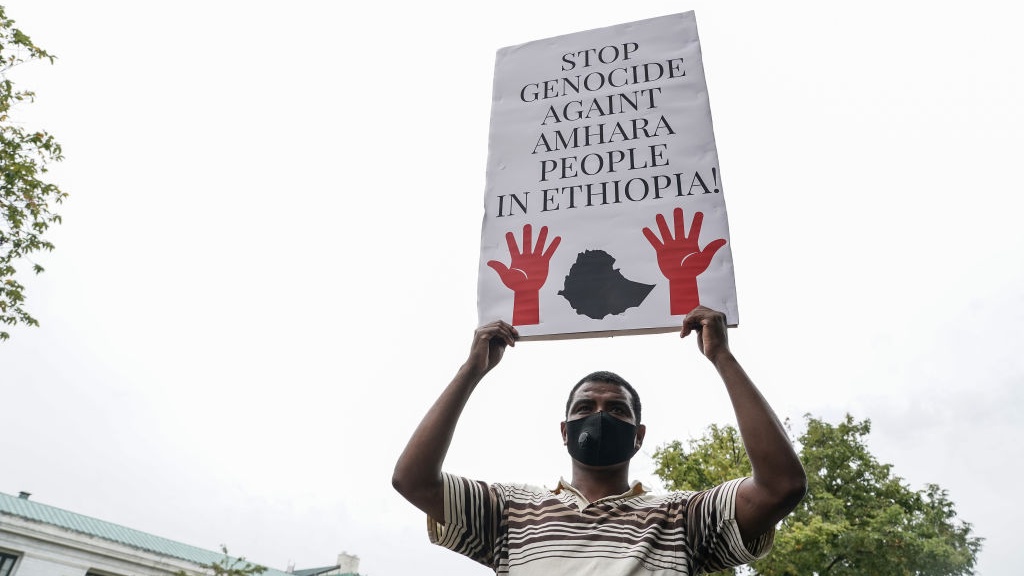Disturbing details of mass killings are being reported in the northern region of Ethiopia after an ongoing feud between opposing political groups escalated to violence in recent days. While much of the details about the violence has been difficult to confirm due to a communication blackout in the area, Amnesty International said dozens of people, potentially hundreds, were stabbed or hacked to death on Monday in the town of Mai-Kadra in the Tigray region.
According to CBS News, tensions escalated last week when Ethiopian Prime Minister Abiy Ahmed ordered an attack on local officials in Tigray, accusing them of attacking a military base in the region. Civilians are now caught up in the ongoing violence between the federal government and the Tigray People's Liberation Front.
With roads blocked in the area and journalists unable to get access, Amnesty International used its Crisis Evidence Lab to digitally verify graphic photographs and videos of dead bodies in Mai-Kadra.
"We have confirmed the massacre of a very large number of civilians, who appear to have been day labourers in no way involved in the ongoing military offensive. This is a horrific tragedy whose true extent only time will tell as communication in Tigray remains shut down," Deprose Muchena, Amnesty International's director for East and Southern Africa, said in a statement.
The verified images, along with eyewitness accounts, indicate that most of the dead bodies were found in the town's center, along a road leading to the neighboring town of Humera. Witnesses said there were no signs of gunshot injuries, but gaping wounds were seen in the victims, appearing to have been attacked by knives and machetes.
"Those wounded told me they were attacked with machetes, axes and knives. You can also tell from the wounds that those who died were attacked by sharp objects. It is horrible and I am really sad that I witnessed this in my life," one unidentified witness told the organization.
Although Amnesty International has not identified who is responsible for the mass killings, witnesses are pointing to the Tigray People's Liberation Front, which allegedly carried out the attack on civilians in retaliation to the federal government's action.
A civilian who entered Mai-Kadra after it was retaken by government forces following the mass killings described the gruesome details.
"When we entered, we saw a lot of dead bodies, soaked in blood, on the streets and rental dormitories frequented by seasonal workers. The view was really debasing, and I am still in shock struggling to cope with the experience," the unidentified witness told Amnesty International.
According to the Associated Press, the TPLF has denied reports of mass killings in Mai-Kadra. Tigray regional president Debretsion Gebremichael said the allegations are being repeated by the prime minister and “being proliferated with the intent to incite hatred toward (ethnic) Tigrayans in Ethiopia.”
However, the Tigray regional government has taken responsibility for firing rockets at two airports in the neighboring Amhara region on Friday, saying the strikes will continue “unless the attacks against us stop,” the AP reported.
The conflict has caused thousands of Ethiopians to flee to neighboring Sudan and raised concerns about a possible civil war. Humanitarian organizations and world leaders have urged the parties involved to deescalate tension.
"I am alarmed at the violence in Ethiopia. Its leaders must deescalate immediately, ensure humanitarian access to civilians in Tigray, and enter into an inclusive dialogue that protects the rights of all citizens to participate in free and fair elections," U.S. Senator Elizabeth Warren wrote on Twitter.
I am alarmed at the violence in Ethiopia. Its leaders must deescalate immediately, ensure humanitarian access to civilians in Tigray, and enter into an inclusive dialogue that protects the rights of all citizens to participate in free and fair elections. https://t.co/Uhe4Ynb4mC
— Elizabeth Warren (@SenWarren) November 9, 2020
Abiy, who won the Nobel Peace Prize in 2019 for solving the country's border conflict with neighboring Eritrea, has rejected the global pressure to deescalate. The prime minister said there would be no negotiations with the opposition until the “law enforcement operation” is over, the AP reported.
"Our rule of law operation is aimed at guaranteeing peace and stability once and for all by bringing perpetrators of instability to justice," Abiy stated.
#Ethiopia is grateful for friends expressing their concern. Our rule of law operation is aimed at guaranteeing peace and stability once and for all by bringing perpetrators of instability to justice. 1/2
— Abiy Ahmed Ali ???????? (@AbiyAhmedAli) November 9, 2020
Sajjad Mohammad Sajid, the U.N. humanitarian chief for Ethiopia, said “It’s a very serious situation.”
“It looks like, unfortunately, this may not be something which can be resolved by any party in a week or two," Sajid told the AP. "It looks like it’s going to be a protracted conflict, which is a huge concern from the point of view of protection of civilians.”
According to NPR, the feud goes back to 2018 when Abiy came to power. That's when the prime minster dismantled the Ethiopian People's Revolutionary Democratic Front, a coalition of ethnically-based political parties which had run the country for 30 years.
The TPLF, which was regarded as the leading member of the EPRDF, was not in favor of the reform. Abiy has since been blaming the TPLF for inciting ethnic violence and destabilizing the country. The conflict took another turn during the summer when the TPLF held a regional election despite the federal government's order to postpone elections due to the COVID-19 pandemic.
In a statement last week, Abiy said the TPLF organized an attack on the Ethiopian military's Northern Command. But the opposition denied the allegation.
"Dr. Abiy Ahmed's one-man dictatorial regime has started to unravel the constitutionally-established state institutions. He is also endangering the unity of this ancient country," Debretsion Gebremichael, Tigray's regional president, said in a letter to the African Union.
